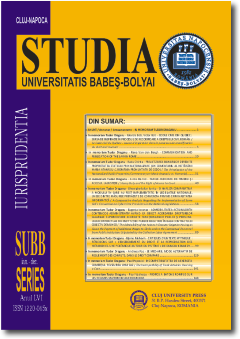DIVERSIONS FORMS AND THE RELATION OF THE PROSECUTION AND INVESTIGATION IN THE CRIMINAL PROCEDURAL LAW
DIVERSIONS FORMS AND THE RELATION OF THE PROSECUTION AND INVESTIGATION IN THE CRIMINAL PROCEDURAL LAW
Author(s): Vince VáriSubject(s): Law, Constitution, Jurisprudence
Published by: Studia Universitatis Babes-Bolyai
Keywords: efficiency; case selection; diversions; simplifying investigation.
Summary/Abstract: The social expectation of efficiency against criminal investigation is formulated more and more vigorously. The efficiency of investigations can be apprehended through exploring the statistically measurable criteria of success and also through applying the rules of criminal procedure law legally and expertly. The police fulfill all these with strictly obeying the legal and professional regulations enforced by the prosecution. However, the result-centric requirement system makes the whole criminal jurisdiction system contraproductive if the directing conditions and activity competences of the structure and the function of the subsystems (the prosecution, the police) are not settled clearly along a uniform efficiency aim philosophy. Their own internal functional management adjusted to the general function of the police can easily conflict with the criminal investigation activity directed by the prosecution. For this reason, only creating the legal institution of cooperation between the subsystems can make way for improving the whole jurisdiction.
Journal: Studia Universitatis Babes Bolyai - Iurisprudentia
- Issue Year: 62/2017
- Issue No: 2
- Page Range: 76-87
- Page Count: 12
- Language: English

